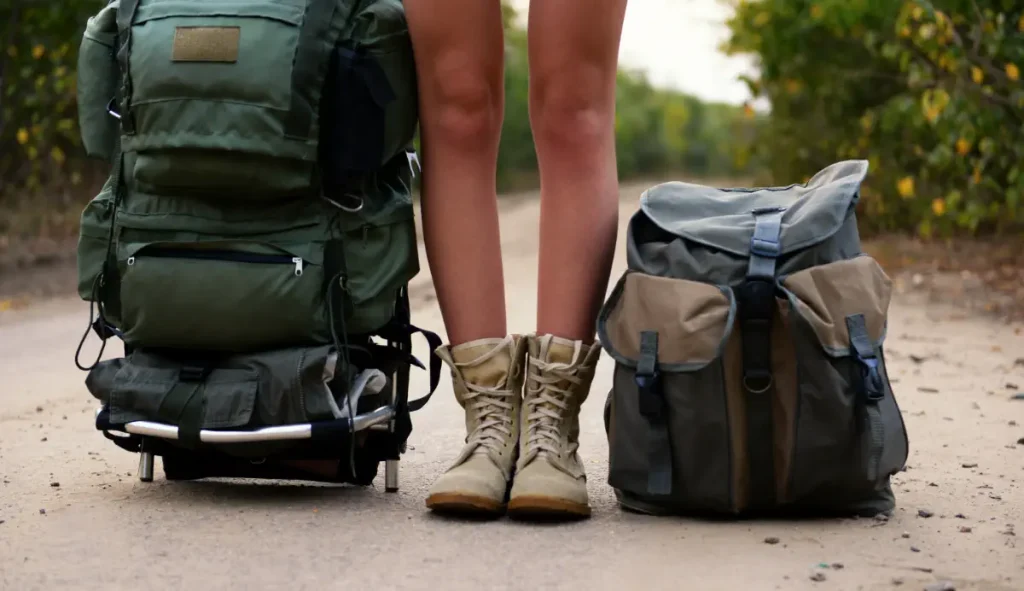Embarking on an adventurous day of hiking or globe-trotting brings with it the excitement of the unknown. As you step out, the right bag becomes your trusty sidekick, ready to safeguard all your essentials. The unpredictable journey ahead makes quick and efficient access to your gear not just a convenience, but a necessity. This brings us to a crucial crossroads: what’s the ideal choice for your escapade – a robust hiking pack or a versatile travel pack? Read on to discover which companion best suits your adventure.

Choosing a hiking pack vs. a travel pack depends largely on your use. Hiking packs are excellent for long hikes, offering large sizes, added support, and even load distribution, making them ideal for carrying heavier loads over longer distances. Travel packs, on the other hand, are great for day hikes or when you’re flying, as they are generally smaller, TSA-friendly with a dedicated laptop pocket, and can be accessed in a hurry.
Detailed Analysis of Hiking Packs and Travel Packs
Hiking Packs:
Hiking packs are specifically designed for the trails. They come in various sizes, typically ranging from 40 liters for overnight trips to 70 liters or more for extended journeys. These packs are built to handle rugged terrain and varying weather conditions, offering features like water-resistant material and secure, easily accessible pockets.
Pros:
- Ergonomic Design: Hiking packs are designed to distribute weight evenly across your body, minimizing strain on any single point. This design includes features like adjustable shoulder straps, hip belts, and sternum straps, which help in distributing the pack’s weight more evenly across the body.
- Durability: Made with robust materials, these packs can withstand harsh conditions, from abrasive rock surfaces to heavy downpours.
- Specialized Compartments: Many hiking packs come with hydration reservoirs, sleeping bag compartments, and tool attachments, making them incredibly functional for a variety of hiking needs.
Cons:
- Weight: Due to their robust construction and additional features, hiking packs can be heavier than travel packs, even when empty.
- Size: Their larger size can be a drawback for shorter trips or for those who prefer to travel light.
Travel Packs:
Travel packs are a hybrid between a traditional backpack and a suitcase. They are perfect for urban travel, short hikes, or any situation where mobility and compactness are key.
Pros:
- Convenience for Air Travel: Many travel packs conform to airline carry-on specifications and include padded compartments for electronics, making them ideal for air travel.
- Versatility: These packs often feature a more streamlined design, making them suitable for a variety of travel situations, from city exploration to short nature walks.
Cons:
- Limited Capacity: Travel packs may not have the capacity required for longer trips where more gear is needed.
- Less Support for Heavy Loads: They may not offer the same level of support and weight distribution as hiking packs, which can be a downside for longer treks.
Choosing the Right Pack for Your Needs
- Intended Use: Consider the primary purpose of the pack. If you’re planning multi-day hikes in rugged terrain, a hiking pack is essential. For city travel and short hikes, a travel pack might be more practical.
- Comfort and Fit: Regardless of the type, ensure the pack fits well. Look for adjustable straps and a size appropriate for your body type.
- Material and Durability: Consider the material based on your destination’s weather conditions. Water-resistant materials can be vital for rainy climates, while lighter materials are better for hot environments.
- Eco-Friendly Options: With a growing focus on sustainability, consider packs made from recycled materials. These eco-friendly options reduce environmental impact without compromising on quality and durability.
Latest Trends in Pack Technology
- Smart Features: Some modern packs come equipped with smart features like built-in USB chargers, RFID protection pockets, and solar panels.
- Customization: Modular packs with detachable components offer customization based on the length and type of your trip.
- Innovative Materials: The use of ultra-lightweight yet strong materials like Dyneema makes packs lighter without sacrificing strength.
FAQs About Choosing Between Hiking and Travel Packs
Hiking packs are specifically designed for outdoor trails, offering features like better weight distribution, larger capacity, and durability against harsh conditions. Travel packs, on the other hand, are more suited for urban travel or short hikes, with a compact design, TSA-friendly features, and often a more stylish appearance.
While travel packs are versatile, they may not provide the necessary support and space for a multi-day hiking trip. Hiking packs are better equipped for carrying larger loads comfortably over longer periods, thanks to their design and features like hip belts and suspension frames.
Yes, some hiking packs can be suitable for airline travel, especially if they fit within carry-on size limits. However, they might lack dedicated compartments for laptops or toiletries that are commonly found in travel packs, making them less convenient for airport security checks.
The size of the pack should be based on the length of your trip and the amount of gear you need to carry. For day trips or light travel, a smaller travel pack might suffice. For longer, more gear-intensive trips, a larger hiking pack would be more appropriate. Always consider your own physical comfort and ability to carry the pack when choosing the size.
Look for adjustable straps, a comfortable back panel, and a fit that matches your torso length. A good pack should distribute weight evenly to avoid strain. For hiking packs, additional features like a hip belt and a sternum strap can greatly enhance comfort and stability.
The choice between a hiking pack and a travel pack ultimately depends on your specific needs and the nature of your trip. While a hiking pack is ideal for longer, more demanding treks, a travel pack offers convenience and flexibility for lighter travel and short hikes. Consider the factors of comfort, capacity, durability, and the specific features that will enhance your travel experience. Remember, the best pack is one that suits your trip’s needs while providing comfort and efficiency.
